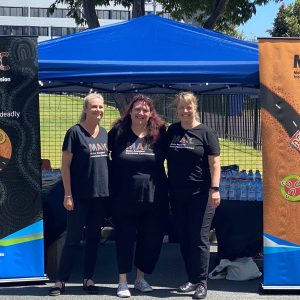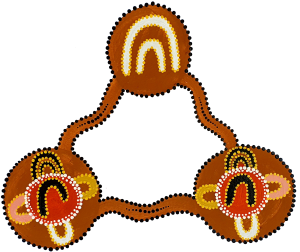The Motor Accident Insurance Commission (MAIC) is committed to building awareness of Queensland’s compulsory third party (CTP) insurance scheme as a safe and supportive system for First Peoples who experience road trauma. That includes supporting initiatives that keep First Peoples safe on Queensland roads to minimise their need to access the CTP insurance scheme.
The past few months have seen us connecting with community, supporting research and embracing partnerships to drive positive outcomes for First Peoples injured in motor vehicle crashes.
Connecting with community

Our staff attended the Gold Coast Titans’ NAIDOC Day Event in December to yarn with community members about CTP insurance. Over a thousand people attended the event hosted by Gold Coast Titans, Deadly Choices and the Kalwun Development Corporation at CBUS Super Stadium in Robina.
Our team enjoyed connecting face-to-face with community members to raise awareness of how CTP insurance can help First Peoples injured in motor vehicle crashes. We look forward to more opportunities to do so in the future.
Supporting research to uncover challenges and opportunities
Dr Leda Barnett from The Hopkins Centre joined us at the event to recruit First Peoples for her MAIC-funded research into their experiences with motor vehicle crashes and CTP insurance.
The research will examine the factors that influence First Peoples to engage with the CTP insurance scheme following a motor vehicle crash, the nature of their experience and ways in which the scheme could better align with their needs.
It aims to uncover and develop best practices and better cohesion between First Peoples and the CTP insurance scheme. If you or someone you know is interested in participating, please contact Dr Barnett on l.barnett@griffith.edu.au.
Building strong partnerships

MAIC is excited to partner with the National Injury Insurance Agency, Queensland (NIISQ Agency) in a memorandum of understanding to better support people injured in motor vehicle crashes.
MAIC delivers the CTP insurance scheme in Queensland which supports people injured in motor vehicle crashes through no fault of their own.
The NIISQ Agency is responsible for administering the National Injury Insurance Scheme, Queensland (NIISQ) which provides necessary and reasonable lifetime treatment, care and support to people who sustain eligible serious injury in motor vehicle accidents, regardless of who was at fault.
Together, MAIC and NIISQ provide an important safety net for people injured in motor vehicle crashes on Queensland roads. To convey our partnership, disability advocate and Elder Uncle Paul Calcott created a special artwork symbolising our union.
The artwork represents the two schemes, MAIC and NIISQ, being overseen and supported by a non-First Peoples Elder who is a respected member of their community and holds authority. The Elder is represented by the white symbol.
NIISQ is depicted by the yarning circle on the left, with a First Peoples individual with disability in the centre, representing the support NIISQ provides to its participants. MAIC is represented by the yarning circle on the right depicting a First Peoples individual in the centre, without disability, to convey our efforts to prevent injuries from being sustained in motor vehicle crashes.
Within each yarning circle, the various stakeholders that MAIC and NIISQ support are featured. The black symbol represents a First Peoples Elder, reflecting the relationships MAIC and NIISQ have developed to support cultural knowledge. The pink symbol represents the LGBTIQ+ community, the brown symbol conveys multiculturalism, and the white symbol represents non-First Peoples. Yellow dots around each person depict the human spirit.
A line in the centre of each element shows that we are all connected, and the brown colour represents the earth that we all stand on as part of our shared connection.
Advancing reconciliation
Both MAIC and the NIISQ Agency are developing Reconciliation Action Plans (RAPs) to set out their intentions to support reconciliation with First Peoples. We look forward to sharing more information about our Reconciliation Action Plans as they come to fruition.